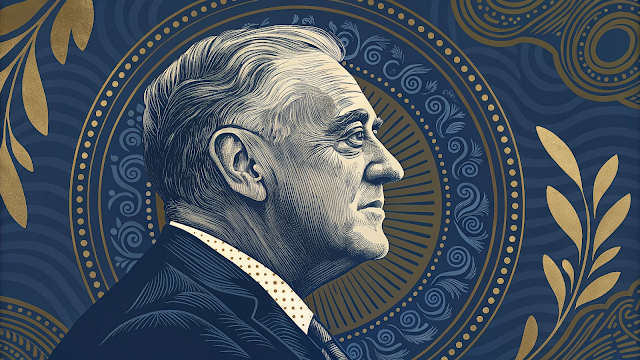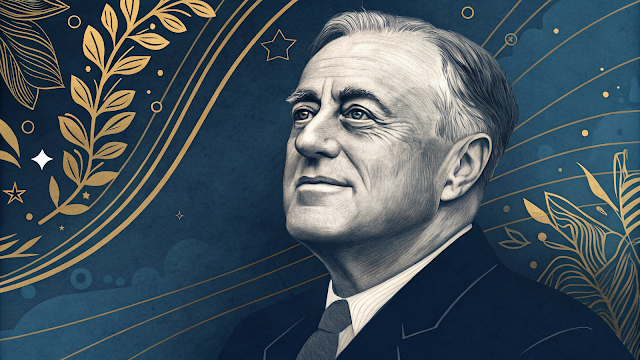"The only limit to our realization of tomorrow will be our doubts of today." - Franklin Roosevelt.
"미래를 실현하는 데 있어 단 한 가지 한계는 현재를 의심하는 것이다." - 프랭클린 루스벨트.
Overcoming Today's Doubts: Roosevelt's Vision for Tomorrow
Franklin Delano Roosevelt (1882-1945) served as the 32nd President of the United States from 1933 until his death in 1945, guiding America through two of its greatest challenges: the Great Depression and World War II. Despite being paralyzed from the waist down due to polio, Roosevelt projected strength and optimism that inspired a nation in crisis. His New Deal programs transformed American government and society, while his leadership during WWII helped secure Allied victory. As the only president elected to four terms, FDR's resilience in the face of personal and national adversity makes his insights on doubt and possibility particularly meaningful.
프랭클린 델라노 루즈벨트(1882-1945)는 1933년부터 1945년 사망할 때까지 미국의 32대 대통령으로 재직하며, 미국을 대공황과 제2차 세계대전이라는 두 가지 가장 큰 도전을 통해 인도했습니다. 소아마비로 인해 허리 아래가 마비되었음에도 불구하고, 루즈벨트는 위기에 처한 국가에 영감을 준 힘과 낙관주의를 보여주었습니다. 그의 뉴딜 프로그램은 미국 정부와 사회를 변화시켰으며, 제2차 세계대전 동안의 그의 리더십은 연합국의 승리를 확보하는 데 도움을 주었습니다. 네 번의 임기에 선출된 유일한 대통령으로서, FDR의 개인적 및 국가적 역경에 직면한 회복력은 의심과 가능성에 대한 그의 통찰력을 특히 의미 있게 만듭니다.
The Power of Self-Limitation
"The only limit to our realization of tomorrow will be our doubts of today." This profound statement captures a fundamental truth about human achievement and progress. Roosevelt suggests that our external limitations are rarely as restrictive as the internal boundaries we create through doubt. When we question our abilities, worthiness, or chances of success, we erect invisible barriers that prevent us from taking necessary actions or seizing opportunities. These self-imposed limitations often prove more constraining than any objective obstacle, as they restrict not just what we do but what we even attempt to do.
"미래를 실현하는 데 있어 단 한 가지 한계는 현재를 의심하는 것이다." 이 심오한 진술은 인간의 성취와 진보에 관한 근본적인 진실을 포착합니다. 루즈벨트는 우리의 외부적 제한이 의심을 통해 우리가 만드는 내부적 경계만큼 제한적인 경우는 거의 없다고 제안합니다. 우리가 우리의 능력, 가치, 또는 성공 가능성에 의문을 제기할 때, 우리는 필요한 행동을 취하거나 기회를 잡는 것을 방해하는 보이지 않는 장벽을 세웁니다. 이러한 자기 부과된 제한은 종종 어떤 객관적인 장애물보다 더 구속적인 것으로 증명되는데, 그것들은 우리가 하는 것뿐만 아니라 우리가 시도하는 것까지도 제한하기 때문입니다.
Roosevelt's Personal Example
Roosevelt's own life powerfully illustrated his philosophy. When polio paralyzed him in 1921, conventional wisdom suggested his political career was over. The limitations imposed by his disability were real, but Roosevelt refused to let doubt define his possibilities. He developed extraordinary upper body strength, devised ways to appear standing in public, and projected such confidence that many Americans remained unaware of the extent of his disability. By focusing on possibilities rather than limitations, he not only revived his political career but rose to lead America through unprecedented crises. His personal triumph over doubt became a template for national resilience.
루즈벨트 자신의 삶은 그의 철학을 강력하게 보여주었습니다. 1921년 소아마비로 그가 마비되었을 때, 통념은 그의 정치 경력이 끝났다고 제안했습니다. 그의 장애로 인한 제한은 실제였지만, 루즈벨트는 의심이 그의 가능성을 정의하도록 두지 않았습니다. 그는 비범한 상체 근력을 발달시키고, 대중 앞에서 서 있는 모습을 보이는 방법을 고안했으며, 많은 미국인들이 그의 장애 정도를 알지 못할 정도로 자신감을 보여주었습니다. 제한보다는 가능성에 초점을 맞춤으로써, 그는 정치 경력을 되살렸을 뿐만 아니라 미국을 전례 없는 위기를 통해 이끌게 되었습니다. 의심에 대한 그의 개인적 승리는 국가적 회복력의 템플릿이 되었습니다.
Doubt in Times of Crisis
Roosevelt's insight takes on special significance when considered in the context of the Great Depression. When he took office in 1933, the American economy had collapsed, unemployment had reached 25%, and collective doubt threatened to undermine democracy itself. Roosevelt recognized that economic recovery required not just policy changes but a fundamental shift in national psychology—from doubt to confidence. His famous declaration that "the only thing we have to fear is fear itself" complemented his insight about doubt, acknowledging that psychological barriers could prevent material progress. By addressing both the practical and psychological dimensions of the crisis, Roosevelt helped America envision and create a better tomorrow.
루즈벨트의 통찰력은 대공황의 맥락에서 고려될 때 특별한 의미를 갖습니다. 1933년 그가 취임했을 때, 미국 경제는 붕괴되었고, 실업률은 25%에 달했으며, 집단적 의심은 민주주의 자체를 약화시킬 위협이 되었습니다. 루즈벨트는 경제 회복이 단지 정책 변화뿐만 아니라 국가 심리의 근본적인 변화—의심에서 자신감으로—를 필요로 한다는 것을 인식했습니다. "우리가 두려워해야 할 유일한 것은 두려움 그 자체"라는 그의 유명한 선언은 의심에 대한 그의 통찰력을 보완하며, 심리적 장벽이 물질적 진보를 방해할 수 있다는 것을 인정했습니다. 위기의 실용적 측면과 심리적 측면 모두를 다룸으로써, 루즈벨트는 미국이 더 나은 내일을 구상하고 창조하도록 도왔습니다.
The Anatomy of Doubt
What makes doubt so limiting? Roosevelt's quote invites us to examine how doubt functions in our lives. Doubt often manifests as negative self-talk, risk aversion, perfectionism, or comparison with others. These mental habits create a constricted view of what's possible, causing us to set smaller goals, delay action, or abandon pursuits prematurely. Doubt also tends to compound over time—each surrender to uncertainty reinforces the belief that we cannot overcome challenges. By recognizing these patterns, we can begin to distinguish between prudent caution and self-defeating doubt, addressing the latter before it limits our potential.
의심은 왜 그렇게 제한적일까요? 루즈벨트의 인용구는 우리가 의심이 우리 삶에서 어떻게 기능하는지 검토하도록 초대합니다. 의심은 종종 부정적인 자기 대화, 위험 회피, 완벽주의, 또는 다른 사람과의 비교로 나타납니다. 이러한 정신적 습관은 가능한 것에 대한 제한된 시각을 만들어, 우리가 더 작은 목표를 설정하거나, 행동을 지연시키거나, 추구를 조기에 포기하게 만듭니다. 의심은 또한 시간이 지남에 따라 복합되는 경향이 있습니다—불확실성에 대한 각각의 항복은 우리가 도전을 극복할 수 없다는 믿음을 강화합니다. 이러한 패턴을 인식함으로써, 우리는 신중한 주의와 자기 패배적 의심을 구별하기 시작할 수 있으며, 후자가 우리의 잠재력을 제한하기 전에 그것을 다룰 수 있습니다.
Practical Application
Roosevelt's wisdom offers practical guidance for overcoming the limitations of doubt. First, we can become more aware of our doubting thoughts, recognizing them as opinions rather than facts. Second, we can take small, consistent actions despite uncertainty—what psychologists now call "behavioral activation." Third, we can surround ourselves with voices of possibility rather than negativity, just as Roosevelt used his fireside chats to foster national confidence. Finally, we can reframe setbacks as temporary and specific rather than permanent and pervasive. These strategies help us move from doubt to determination, expanding our vision of what tomorrow might hold.
루즈벨트의 지혜는 의심의 한계를 극복하기 위한 실용적인 지침을 제공합니다. 첫째, 우리는 의심하는 생각들을 더 인식할 수 있으며, 그것들을 사실이 아닌 의견으로 인식할 수 있습니다. 둘째, 우리는 불확실성에도 불구하고 작고 일관된 행동을 취할 수 있습니다—심리학자들이 현재 "행동 활성화"라고 부르는 것. 셋째, 우리는 루즈벨트가 국가적 자신감을 조성하기 위해 그의 화롯가 대화를 사용한 것처럼, 부정적인 것이 아닌 가능성의 목소리로 우리 자신을 둘러쌀 수 있습니다. 마지막으로, 우리는 좌절을 영구적이고 만연한 것이 아닌 일시적이고 특정한 것으로 재구성할 수 있습니다. 이러한 전략들은 우리가 의심에서 결단력으로 나아가도록 도우며, 내일이 가질 수 있는 것에 대한 우리의 비전을 확장합니다.
Conclusion
Franklin Roosevelt's insight that "The only limit to our realization of tomorrow will be our doubts of today" remains as relevant now as it was during the challenges of his era. In a world facing complex problems from climate change to economic inequality, doubt can seem reasonable—even prudent. Yet Roosevelt reminds us that progress has always required moving beyond comfortable certainty into the realm of possibility. By recognizing doubt as our primary limitation, we gain the power to address it directly, freeing ourselves to envision and create futures that might otherwise remain unrealized. In this way, Roosevelt's wisdom offers not just inspiration but a practical pathway to expanded possibility.
"미래를 실현하는 데 있어 단 한 가지 한계는 현재를 의심하는 것이다."라는 프랭클린 루즈벨트의 통찰력은 그의 시대의 도전 동안과 마찬가지로 지금도 여전히 관련이 있습니다. 기후 변화부터 경제적 불평등까지 복잡한 문제에 직면한 세계에서, 의심은 합리적으로—심지어 신중하게—보일 수 있습니다. 그러나 루즈벨트는 진보가 항상 편안한 확실성을 넘어 가능성의 영역으로 나아가는 것을 요구해 왔다는 것을 상기시킵니다. 의심을 우리의 주요 제한으로 인식함으로써, 우리는 그것을 직접 다룰 수 있는 힘을 얻고, 그렇지 않으면 실현되지 않을 수 있는 미래를 구상하고 창조할 자유를 얻습니다. 이런 방식으로, 루즈벨트의 지혜는 단지 영감뿐만 아니라 확장된 가능성으로 가는 실용적인 경로를 제공합니다.








